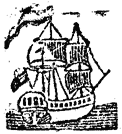Ahoy! Upcoming Talks on the Naval War
 I’m looking forward to two lectures about the naval side of the American Revolution in New England coming up in the next two months.
I’m looking forward to two lectures about the naval side of the American Revolution in New England coming up in the next two months.
First, the Friends of Minute Man National Park will present Emily A. Murphy speaking on “The War Has Made Such An Alteration in People & Things: Privateering and the Revolution at Sea.” This talk will come on Wednesday, 20 January, at 8:00 P.M. at the Trinity Episcopal Church at 81 Elm Street, Concord, Massachusetts. It’s free and open to the public.
Emily is the Historian and Public Affairs Officer for Salem Maritime National Historic Site. She holds a Ph.D. in American Studies from Boston University, where her dissertation, “To Keep Our Trading for Our Livelihood”: The Derby Family and Their Rise to Power, examined how that Salem mercantile family reached political and social prominence. For the National Park Service she’s written the walking tour guide Nathaniel Hawthorne’s Salem and Merchants, Clerks, Citizens, and Soldiers: A History of the Second Corps of Cadets.
Privateering produced an outsourced navy, with governments (mostly the colonies/states) licensing private citizens to arm vessels, hire crews, and hunt down enemy shipping. Instead of receiving government pay, privateers’ crews would share the value of the ships and cargos they captured. Although serving on a privateer carried a lot of the risks of soldiering (death, disease, imprisonment), there was also the possible upside of lots of money.
On Saturday, 20 February, at 4:00 P.M., the Friends of the Longfellow House and Longfellow National Historic Site will host a lecture titled “Cambridge: Birthplace of the American Navy?” That cheeky title reflects the fact that in Cambridge, within that very historic mansion, Gen. George Washington gave the first orders for an armed ship to attack enemy shipping under Continental authority. In the fall of 1775 he put army funds into a schooner called the Hannah, and assigned men from Col. John Glover’s regiment to serve aboard her.
Sending troops out on a ship was a bold move. For one thing, attacking British supply ships was offensive rather than defensive warfare, and could be read to mean the American colonies were seeking independence. For another thing, Washington’s orders from the Continental Congress didn’t really authorize him to oversee a fight at sea.
“Cambridge: Birthplace of the American Navy?” will focus on what that early naval war looked like from Washington’s headquarters, which had a view of the Charles but was many miles from the useful American harbors. One reason I’m looking forward to that talk is that I’m giving it, so I’m naturally interested in hearing what I’ve found to say.

6 comments:
That would be a most interesting lecture. I presented a paper entitled "Small Boat Operations in Long Island Sound, 1775-1779" at a Phi Alpha Theta conference a year ago and what I learned in researching it was most interesting. Glover would have been the natural pick to head up such a task given his background. Of course, being at the right place at the right time didn't hurt either...
Some authors have even credited Glover with the idea of extending the siege of Boston out to sea, but there’s no documentary evidence for that. Certainly his experience as both a merchant used to fitting out ships and an army colonel was invaluable to the effort. There were some rough patches along the way, though.
I'm sorry that I won't be able to make your talk. I presented a paper at a NAVA meeting a few years ago on the "Pine Tree" flag that was flown by some of Washington's cruisers. I'll get it ready for publication one of these days . . .
I guess it's a matter of definition as to whether Washington's flotilla was the beginning of the Navy. I'd argue that it was not -- the ships were Army-manned and Washington was careful to keep them under his personal control. For what it's worth, the US Army has operated many ships during its history, and still has a fairly substantial fleet of its own.
The provincial army was fighting with whaleboats and floating batteries even before Washington got to Cambridge. And even, as you know, flying a naval flag. So we could dig even deeper for the roots of the U.S. Navy than Washington’s headquarters.
I think the definition of the navy is indeed a matter of bureaucracy and semantics. However, I’m struck by how some of the captains in Washington’s little fleet (e.g., John Manley) made the transition to the Continental Navy, and insisted on seniority as they did so. The official navy was in some way recognizing the commander-in-chief’s ad hoc one.
Sorry, I did not mean my previous comment to be "anonymous!" Too quick on the trigger, I guess.
I figured it was you, Peter! Even if you weren’t flying your flag at that moment.
Post a Comment